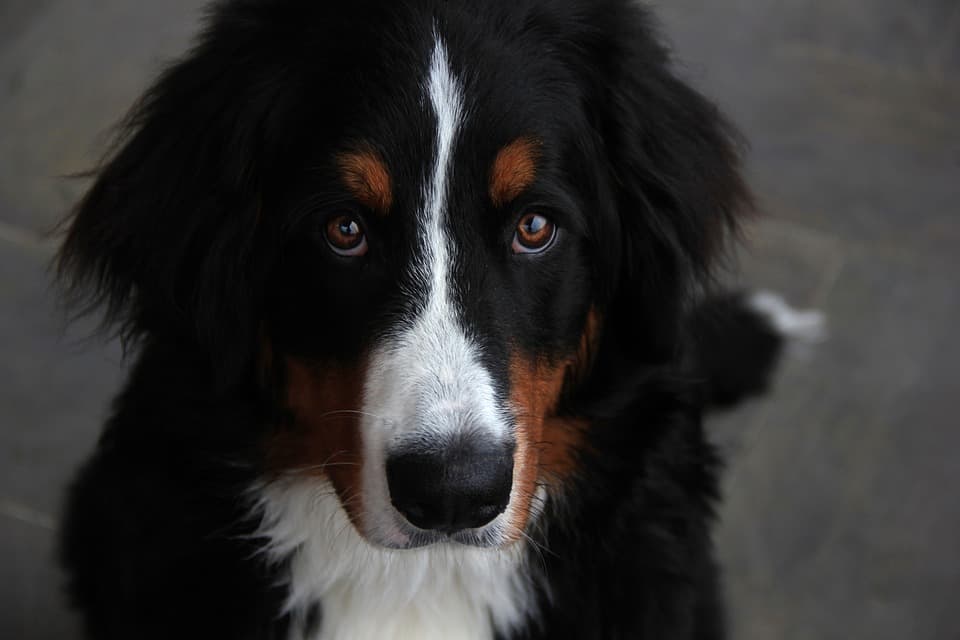
The doggy odor is a well-known phenomenon, and Berners are among the breeds that can get particularly smelly. Why do Bernese Mountain Dogs smell?
Bernese Mountain Dogs can get smelly, especially after swimming in a lake or walking in the rain. The quality of their coat combined with certain environmental conditions is the most common, and benign, cause of the odor. It is important, however, to rule out any pathological causes of strong odors, such as skin or ear infections. Regular hygiene and housekeeping practices minimize the odor.
WHY DOES MY DOG SMELL?
Thick Water Repellent Coat as a Factor in Producing the Doggy Odor
Bernese Mountain Dogs have a double-layer coat that is exceptionally good at insulating the dog and repelling moisture.
They naturally have abundant bacteria living on their skin and fur, and the byproducts of the bacterial activity produce some odors. Swimming in lakes further exposes your Berner’s coat to other living aquatic organisms.
Berners are also among the breeds that produce plenty of sebum, or natural oil, to prevent skin dryness and increase the insulating quality of the fur. A large amount of oil contributes to the odor.
When your Berner gets wet, organic acids become aerosolized with the evaporation of water. That is the mechanism responsible for producing the infamous wet doggy smell. Although it can be bothersome to some people, it is entirely benign.
OTHER CAUSES OF ODOR
Although the doggy smell is usually normal and harmless, other causes may need to be addressed.
If your Berner suddenly develops a strong odor, it is more likely to be a pathological condition making the dog smellier than usual. A sudden change is often a red flag, and it should be evaluated by a veterinarian, especially if there are other changes in the dog’s health or behavior.
Skin Infections
Skin infections are common in dogs. Allergies, parasites, fungi, wounds, and hormonal imbalances can cause skin infections. A veterinarian would diagnose an infection promptly and accurately.
Some clinical signs, such as scratching, restlessness, and changes in intake and output, may also point to a problem, although they are not always specific to skin health. In most cases, medicated shampoos, ointments, and enteral medications effectively treat the infection.
Ear Infections
It may not be obvious when the smell emanates from the ears but this is one of the most common causes of bad odors in dogs. Bacteria and fungi cause strong smells, unlike the regular surface environment of canine ears.
Poor Health Status
Dogs who regularly do not feel well may skip grooming, they often end up being smelly. Certain health conditions, such as kidney and liver disease, can cause bad breath even if the dog does not have dental problems.
Anal Gland Problems
Anal glands are small sacs in the dog’s rectum. They contain foul-smelling liquid animals of many species used to mark territory in their natural habitats. Dogs express their glands when they poop or sometimes when they are stressed.
Dental Concerns
Dogs do not commonly have caries but plaque and gingivitis afflict many grown-up dogs. Those problems lead to bad breath, although it is usually obvious that affected pups have bad breath rather than an overall strong odor.
HOW TO REDUCE THE DOGGY ODOR
There are some basic rules to keep bad odors minimal, although there is not much to do about the normal odors a Bernese Mountain Dog’s thick fur produces, especially when it is wet.
- Brush your dog regularly to remove excess hair and debris.
- Dry your Berner’s fur thoroughly after swimming or bathing. This is particularly important for Bernese Mountain Dogs because they smell when their fur is wet.
- Ensure your dog has proper hygiene in general: occasional baths, and cleaning eyes and ears are important.
- Use a shampoo designed for dogs, and rinse the residue completely. Avoid bathing your Berner frequently, unless needed, as this can dry out the skin and fur, and cause skin problems that further increase the smell.
- Wash your dog’s bedding often.
- Diluted vinegar and baking soda are excellent non-toxic substances to clean surfaces in your home. They deodorize well and don’t leave a harmful residue that would be unsafe for any dog.
To Conclude
Bernese Mountain Dogs are a little smelly but it is important to distinguish the normal odors characteristic of their thick coats from pathological ones caused by some imbalance in their health.
Recent Posts
Many people have conflicting feelings about large animals living in apartments and small spaces. However, regular physical activity is more important than a spacious living area. Bernese Mountain...
These dogs are hardy in winter weather but how do Bernese Mountain Dogs do in a hot climate? Do Bernese Mountain Dogs tolerate hot weather? Bernese Mountain Dogs do not tolerate hot weather. Even...

